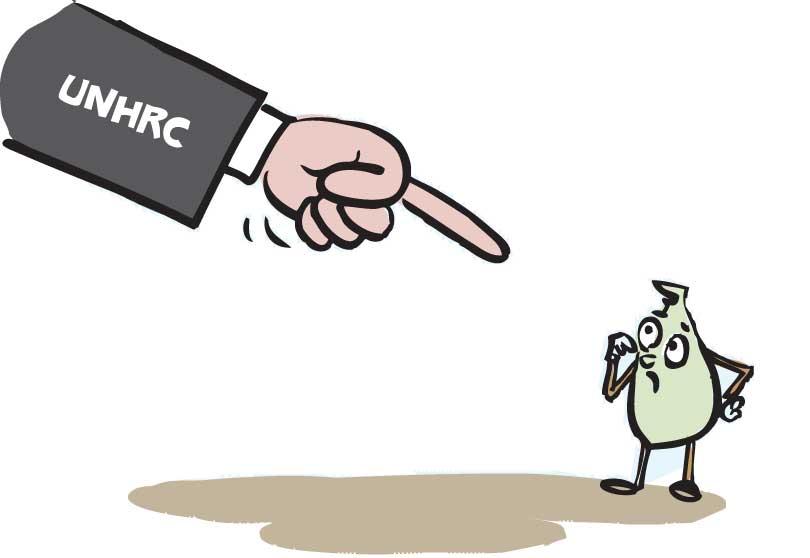Reply To:
Name - Reply Comment

With the March regular session of the United Nations Human Rights Council (UNHRC) approaching, some news detrimental to the Sri Lankan government were heard from abroad. It was mostly so when the Rajapaksas in power in Sri Lanka. Before the regime change in 2015, it was the Britain’s Channel 4 that had been producing such stories almost regularly on the eve of the UNHRC regular sessions.
Taking into account the timing of the decision by the US government to ban Army Commander Lt. General Shavendra Silva and his family from entering the country, it could be inferred as one taken in line with this “ritual.” The US government had not imposed such a ban when he was the Sri Lankan Ambassador to the UN after the war against the LTTE, a designated terrorist organization in the US. Have they found fresh evidence against him?
Subsequent to the regime change in Sri Lanka in 2015, the new government pursued a conciliatory approach towards the West and the UNHRC, even co-sponsoring the resolutions on the human rights situation in the country at the UNHRC, and apparently owing to that the world’s human rights body eased its grip over Sri Lanka. However, it seems that the relationship between the UNHRC and Sri Lanka have started to sour again, with the ouster of the so-called yahapalana government in November which has brought the Rajapaksas to the helm again.
The new government under President Gotabaya Rajapaksa has decided to withdraw the country’s co- sponsorship for the resolutions 30/1 and 40/1 adopted at the HRC in Geneva in 2015 and 2019 respectively, and the decision has already been communicated to the Council’s President Ambassador Elisabeth Tichy-Fisslberger by Foreign Secretary Ravinatha Aryasinha on Friday. Foreign Relations Minister Dinesh Gunawardena who is leading the Sri Lankan delegation for the 43rd regular session of the UNHRC which commenced on Monday is to formally inform the Council members on the government’s decision during his address at the High Level Segment of the Council today.
The question remains as to whether the impact of the resolutions on the country would change by the government’s withdrawal from the co-sponsorship for them. Probably it wouldn’t. It would only pacify the conscience of the leaders of the government and a large section of the populace that believes that no human rights were violated by the armed forced during the war. The authorities of the UNHRC who go by the documents before them would keep on pressing the Sri Lankan government to respect the resolutions and to implement the commitments imposed by them on the country, which happened during the former Mahinda Rajapaksa regime as well.
One cannot contest the arguments by some of the leaders of the government that the US government which initiated the resolutions on (against) Sri Lanka at the world’s human rights body since 2012, has been throughout the history a more atrocious human rights violator in the world. The cities Hiroshima and Nagasaki in Japan and people of Vietnam on whom Napalm bombs were dropped would attest to it. The latest case in point is the US President Trump’s “peace” agreement with Israeli Prime Minister Benjamin Netanyahu which they called the “Deal of the Century” under which more than seven million Palestinian refugees are likely to be deprived of the right to return to their original land.
True, also the world which originally spoke about the human rights violations and war crimes allegedly committed by both the Sri Lankan armed forces and the LTTE has by now totally forgotten the crimes committed by the LTTE, the most ruthless terrorist organization as called by the Western media.
Yet, those arguments would not change the actions by the UNHRC or the impact of the resolutions that have been already passed and those possibly adopted in future. The government has to find a way out with fresh engagements with fresh approaches with the relevant countries and the relevant world bodies. Leaving no room for fresh allegations of human rights violations would be very important in that process, as we have witnessed hardening of the stance by the UNHRC leaders with the escalation of human rights violations after the end of the war.